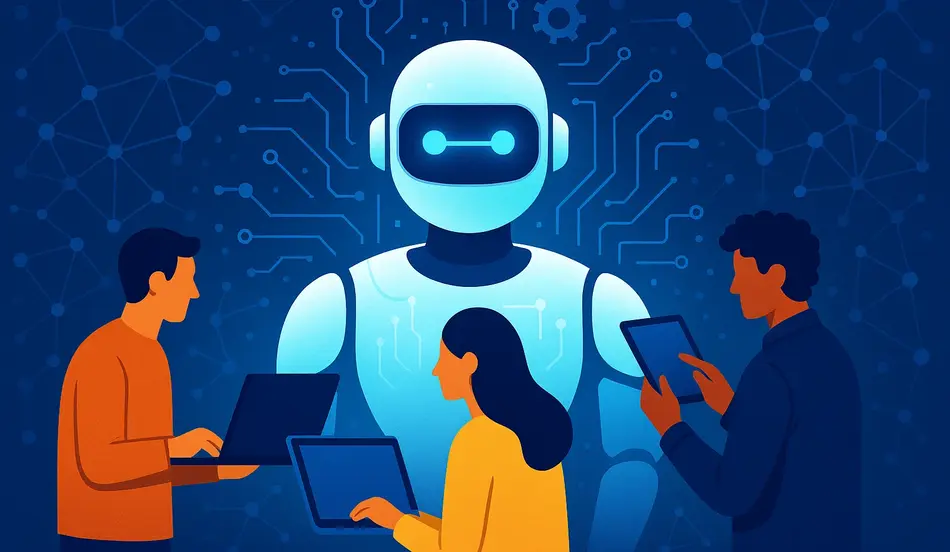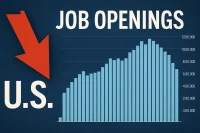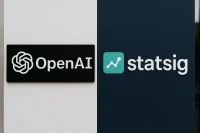AI Agents Revolution is reshaping the modern workforce. As autonomous digital assistants become more advanced, they’re not just supporting humans—they’re making independent decisions, streamlining complex tasks, and opening new frontiers in productivity.
Table of Contents
What Are AI Agents and Why They Matter
AI agents differ fundamentally from the chatbots and AI assistants we’ve grown accustomed to using. While traditional AI tools like ChatGPT operate on a request-response model, AI agents can work autonomously toward achieving specific goals, making decisions and taking actions without constant human supervision.
“Agents are when you give AI a request and they can work indefinitely until they achieve a goal or run into an error and need your help,” explains Amjad Masad, founder of Replit. “The more tools you give the agent, the more powerful it is.”
The Exponential Growth Trajectory
The capabilities of AI agents are expanding at an astonishing pace. Currently, these agents can operate independently for anywhere from 30 seconds to 30 minutes. Research indicates that every seven months, this duration doubles—meaning we could soon have AI agents capable of working for hours, days, or even longer without human intervention.
This exponential growth pattern mirrors what we’re seeing in search trends and business adoption rates, suggesting we’re at the beginning of a technological S-curve that will fundamentally reshape our digital landscape.
Real-World Applications Already Transforming Industries
AI agents aren’t a distant future technology—they’re already transforming how businesses operate and how individuals accomplish everyday tasks:
Business Transformation Through Automation
Companies like Cler have implemented AI customer service agents that handle 2.3 million chats monthly—equivalent to the work of 700 full-time employees. This level of automation represents just the beginning of how AI agents will transform business operations across industries.
For small teams and entrepreneurs, AI agents offer unprecedented leverage. A team of 5-10 people equipped with the right AI tools can accomplish what previously might have required 50 employees and millions in funding. This democratization of capability means entrepreneurs can build, launch, and scale businesses with a fraction of the resources traditionally required.
Personal Productivity Revolution
On an individual level, AI agents are already handling tasks that once required specialized skills:
- Ordering products and services without human intervention
- Building functional websites and applications without coding knowledge
- Managing administrative tasks like scheduling and email correspondence
- Creating content across multiple formats and platforms
The paradigm shift becomes apparent when you consider how these capabilities eliminate traditional barriers to creation and productivity. Tasks that once required specialized training or significant time investment can now be accomplished through conversation with an AI agent.
The Economic Impact: Job Displacement and Creation
The automation capabilities of AI agents will inevitably displace certain types of jobs, particularly those involving routine, predictable tasks:
- Data entry and processing positions
- Quality assurance testing
- Customer service representatives
- Administrative support roles
- Certain aspects of accounting and financial analysis
Even high-status, well-compensated professions aren’t immune. Medical specialists like anesthesiologists—currently among the highest-paid professionals—could see their roles dramatically transformed as AI systems take over monitoring and decision-making functions.
From Job Displacement to Career Transformation
While job displacement is concerning, history suggests that technological revolutions typically create more opportunities than they eliminate—though these opportunities often require different skills and appear in unexpected places.
The emerging AI economy will likely place greater value on:
- High agency individuals who can effectively direct and coordinate AI systems
- Creative problem-solvers who can identify novel applications for AI capabilities
- Those who can bridge the gap between technical capabilities and human needs
- People skilled at building relationships and fostering human connections
As evolutionary biologist Brett Weinstein notes, “This is the first time that we have built machines that have crossed the threshold from the highly complicated into the truly complex.” This complexity means we’re entering uncharted territory where adaptability and general problem-solving skills become increasingly valuable.
The Democratization of Opportunity
One of the most promising aspects of the AI agent revolution is its potential to democratize opportunity. Traditional barriers to entrepreneurship and wealth creation—such as access to capital, specialized technical knowledge, or geographic location—are being dramatically reduced.
“For the first time, access to opportunity is equal,” notes Masad. With tools like Replit, individuals with no coding experience can build functional software applications in minutes rather than months, opening entrepreneurial possibilities previously reserved for those with technical backgrounds or substantial resources.
This democratization could enable innovation from previously untapped sources around the world. A creative individual in Bangladesh or Cape Town now has access to the same AI-powered tools as someone in Silicon Valley, potentially unleashing a wave of global entrepreneurship and problem-solving.
Navigating the Transition: Challenges and Considerations
Despite its promise, the AI agent revolution presents significant challenges that individuals, organizations, and societies must address:
The Speed and Scale of Change
Unlike previous technological revolutions that unfolded over decades, the AI transformation is happening at unprecedented speed. This rapid pace leaves little time for adaptation, potentially creating significant disruption in labor markets and economic systems.
The scale of potential displacement is also concerning. According to research cited in the discussion, jobs requiring only a high school diploma have an automation risk of 80%, while those requiring a bachelor’s degree have an automation risk of just 20%. Women are disproportionately affected, with about 80% of working women in at-risk jobs compared to just over 50% of men.
The Crisis of Meaning
Beyond economic considerations, the AI agent revolution raises profound questions about human purpose and meaning. If many traditional forms of work become obsolete, how will people derive the sense of purpose and accomplishment that meaningful work provides?
This question becomes particularly acute when considering the potential for “hyper-novelty”—a state where the rate of change outpaces our capacity to adapt, creating mismatches between our developmental environment and adult reality that can lead to psychological distress.
Preparing for the AI Agent Future
Whether you’re a business leader, entrepreneur, or individual contributor, preparing for the AI agent revolution requires a strategic approach:
For Businesses and Organizations
- Identify Automation Opportunities: Evaluate your operations to identify processes that could benefit from AI agent implementation.
- Invest in AI Literacy: Ensure your team understands AI capabilities and limitations to effectively leverage these tools.
- Develop a Human-AI Collaboration Strategy: Determine how human workers and AI agents will collaborate to maximize the strengths of each.
- Consider Ethical Implications: Establish guidelines for responsible AI agent deployment that respects privacy, security, and human well-being.
For Individuals and Professionals
- Embrace Continuous Learning: Develop a habit of regularly exploring new technologies and adapting your skills accordingly.
- Focus on Uniquely Human Skills: Invest in developing creativity, emotional intelligence, critical thinking, and interpersonal abilities that complement rather than compete with AI capabilities.
- Experiment with AI Tools: Gain hands-on experience with current AI systems to understand their potential and limitations.
- Cultivate High Agency: Develop your ability to set clear goals, make decisions, and take initiative—skills that will be increasingly valuable in directing AI systems.
Hiring?
Post jobs for free with WhatJobs — Find AI-savvy talent ready for tomorrow’s workplace.
Post a Job NowThe Future Landscape: Possibilities and Concerns
As AI agents continue to evolve, several trends and concerns are emerging:
Increased Autonomy and Capability
As large language models continue to improve and gain access to more tools and data sources, AI agents will become capable of handling increasingly complex tasks with less human oversight. This progression will likely follow an exponential rather than linear path.
Integration Across Digital and Physical Realms
While current AI agents primarily operate in digital environments, the integration with robotics and IoT devices will extend their influence into the physical world. This convergence will enable AI agents to not only process information but also manipulate physical objects and environments.
Security and Misuse Concerns
The same capabilities that make AI agents powerful tools for legitimate purposes could be exploited for scams, misinformation, or cyber attacks. The rise of deepfakes and AI-powered scams is already creating challenges for individuals and organizations alike.
As one participant in the discussion noted, dealing with deepfake videos and scams has become a weekly occurrence, requiring significant resources to combat and potentially causing real harm to vulnerable individuals.
Autonomous Weapons and Surveillance
Perhaps most concerning is the potential for AI agents to be deployed in autonomous weapons systems or surveillance networks. The combination of facial recognition, autonomous decision-making, and physical capability raises profound ethical and security questions that societies must address.
Conclusion: Navigating the AI Agent Revolution
The rise of AI agents represents one of the most significant technological shifts of our lifetime—comparable to the invention of the internet or mobile computing in its potential impact. While the challenges are substantial, the opportunities for enhanced productivity, creativity, and problem-solving are equally immense.
Success in this new landscape will require not just technical adaptation but also thoughtful consideration of how these tools can best serve human flourishing. By approaching AI agents as partners rather than replacements, we can work toward a future where technology amplifies rather than diminishes human potential.
The AI agent revolution is already underway. Those who understand its implications and adapt accordingly will be best positioned to thrive in the transformed digital landscape of tomorrow.
Related Post: Explore Top Jobs on WhatJobs
Looking to future-proof your career in the age of AI? Explore emerging opportunities on WhatJobs, where you can search thousands of positions across industries being transformed by artificial intelligence.
FAQ: Understanding AI Agents
What exactly is an AI agent and how does it differ from tools like ChatGPT?
AI agents are autonomous systems that can work independently toward achieving specific goals without constant human guidance. Unlike traditional AI tools that operate on a request-response model, AI agents can make decisions, use multiple tools, and continue working until they complete an objective or require human assistance. They represent a significant evolution in artificial intelligence capability by combining reasoning with the ability to take actions in digital environments.
How will AI agents impact employment and job security in the coming years?
AI agents will likely cause significant disruption in the job market, particularly for roles involving routine, predictable tasks. Jobs in data entry, customer service, quality assurance, and administrative support are at highest risk. However, history suggests technological revolutions typically create more opportunities than they eliminate, though these new roles often require different skills. The transition period will be challenging, requiring intentional reskilling efforts and possibly new social support systems.
What skills should I develop to remain valuable in an economy dominated by AI agents?
Focus on developing skills that complement rather than compete with AI capabilities. These include creativity, emotional intelligence, critical thinking, ethical judgment, and interpersonal abilities. Additionally, developing “high agency” – the ability to set goals, make decisions, and take initiative – will be increasingly valuable as directing AI systems becomes an important meta-skill. Continuous learning and adaptability will be essential as the technology landscape evolves rapidly.
How can businesses responsibly implement AI agents while minimizing negative impacts?
Responsible implementation of AI agents requires a thoughtful approach that considers both business objectives and broader societal impacts. Businesses should: 1) Start with clear use cases where AI agents can add genuine value rather than implementing technology for its own sake; 2) Invest in retraining employees whose roles may be affected; 3) Establish ethical guidelines for AI agent deployment that respects privacy and security; 4) Maintain human oversight of critical decisions; and 5) Regularly evaluate the impacts of automation on employees, customers, and communities.




